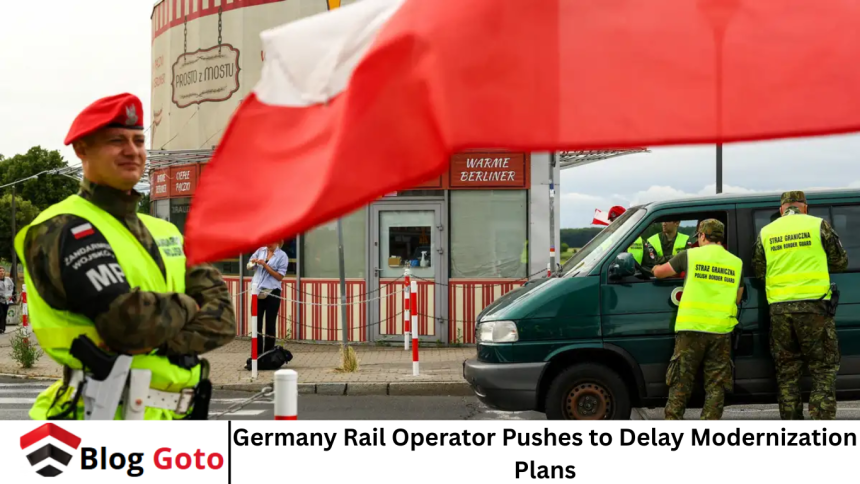Germany’s railway network, once a symbol of European engineering excellence and punctuality, has faced mounting criticism in recent years for chronic delays, outdated infrastructure, and operational inefficiencies. At the center of the country’s plans for recovery and future-readiness is a sweeping modernization program aimed at transforming the rail system into a more robust, digital, and sustainable mode of transport.
This controversial move comes at a time when Europe is investing heavily in climate-conscious public transportation, and when Germany’s climate goals are tied closely to rail expansion and reliability. With billions of euros already allocated and timelines publicly committed.
DB’s appeal for postponement has sent ripples through government ministries, industry partners, commuters, and environmental advocates. This article explores the complexities behind Deutsche Bahn’s request, the implications of delaying modernization.
More Read: S&P 500 and Nasdaq Hit Record Highs as Nvidia’s Valuation Nears $4 Trillion
Background: Why Modernization Is Critical for German Rail
Germany’s rail network is one of the most extensive in Europe, covering over 33,000 kilometers and serving millions of passengers daily. Yet it is widely acknowledged that the system is struggling under outdated infrastructure and rising operational stress. Many sections of track, signal systems, and stations date back to the mid-20th century or earlier.
Modernization plans were introduced in response to these challenges and include:
- Track replacements and upgrades
- Digital signal systems
- Expansion of high-speed rail
- Greener trains and stations
- Electrification of diesel routes
The federal government had committed over €45 billion to the railway system between 2020 and 2030, with a heavy emphasis on technological innovation and carbon reduction.
Yet despite this momentum, Deutsche Bahn has now urged the federal government to slow down or stagger the modernization process, citing logistical bottlenecks, personnel shortages, and supply chain issues.
Deutsche Bahn’s Position: Why the Delay Request?
According to sources within Deutsche Bahn, the modernization program, while well-intentioned, is overwhelming the operator’s current capacity to manage disruptions and carry out upgrades without compromising day-to-day operations.
Key reasons cited by DB include:
- Network Congestion: With so many simultaneous construction projects, critical corridors have become highly congested, causing delays and rerouted traffic.
- Passenger Dissatisfaction: Service quality is worsening during construction phases, with increased cancellations and longer commute times.
- Supply Chain Disruptions: Post-pandemic shortages in construction materials and digital equipment are hindering project timelines.
- Labor Shortages: A lack of skilled engineers, technicians, and project managers is delaying implementation.
- Budget Overruns: Rising inflation and construction costs have already pushed several projects over budget, causing DB to reevaluate their financial sustainability.
In a statement, DB’s CEO Richard Lutz explained, “We fully support the long-term vision of a modern, digitized railway system. But we must take a realistic approach. Pushing forward without sufficient resources will ultimately compromise our service quality and derail public trust.”
Government and Political Response
The German Federal Ministry for Digital and Transport (BMDV), headed by Minister Volker Wissing, has responded with caution. While the ministry acknowledges the concerns raised by Deutsche Bahn, officials have stressed that delaying modernization could risk non-compliance with EU climate targets and jeopardize international competitiveness.
Political reactions have been mixed:
- Green Party lawmakers expressed frustration, calling any delay “a step backward in Germany’s climate and mobility commitments.”
- Free Democratic Party (FDP) members urged a pragmatic compromise, suggesting a phased implementation.
- Social Democrats (SPD), part of the governing coalition, are divided—some pushing for flexibility, others warning against losing credibility with voters.
- Opposition parties have used the opportunity to criticize the government’s rail policies, citing poor management and unrealistic scheduling from the start.
- The Chancellery has not yet issued an official statement, but insiders suggest that a review of the modernization schedule is underway.
Impact on Commuters and the Economy
Perhaps the most immediate consequence of any delay would be felt by Germany’s commuters and freight partners. Trains remain a vital mode of transport for millions of people—especially in urban hubs like Berlin, Hamburg, and Frankfurt. Furthermore, Deutsche Bahn handles a significant portion of the country’s cargo transport.
Commuter Consequences:
- Continued delays and overcrowding
- Diminished trust in rail reliability
- Hindered shift from car to rail travel
Economic Consequences:
- Delayed freight movement affecting manufacturing timelines
- Loss of business confidence in rail logistics
- Potential fines from the EU for unmet emission reduction targets
The Verband Deutscher Verkehrsunternehmen (VDV), an association of German transport companies, issued a warning that postponing upgrades could cost the economy billions in lost productivity over the coming decade.
The Role of Technology and Innovation
One of the most anticipated aspects of the modernization was the implementation of the European Train Control System (ETCS) and digital interlockings to allow more efficient and automated train operations. These systems are critical not only for improving safety and performance but also for increasing rail capacity without new tracks.
If delayed, these innovations would:
- Postpone the introduction of semi-autonomous trains
- Prevent data-driven scheduling improvements
- Hinder energy-efficient operations
- Limit real-time responsiveness to network congestion
Germany risks falling behind France, Switzerland, and the Netherlands, where similar digital transitions are already well underway.
Environmental and Climate Implications
Germany has pledged to become climate-neutral by 2045, and a key component of that strategy is to double the number of rail passengers by 2030 and shift freight from road to rail. Rail travel emits significantly fewer greenhouse gases than cars or trucks.
Delaying rail modernization threatens to:
- Stall progress toward climate goals
- Increase reliance on road transport and fossil fuels
- Undermine EU Green Deal initiatives
Environmental groups, including Greenpeace Germany, have voiced strong opposition to the postponement. A spokesperson said, “We cannot afford to delay climate-friendly transport. Every year we postpone modernization, we increase our emissions burden.”
International Implications and Public Image
Germany’s railway is not just a domestic concern—it is part of a broader trans-European network, linking countries and facilitating cross-border trade and travel. A sluggish modernization effort could tarnish Germany’s reputation as a logistics leader and eco-conscious nation.
Key risks include:
- Reduced connectivity with EU neighbors
- Negative impact on Germany’s export economy
- Loss of influence in EU transportation policy
Moreover, Germany has long prided itself on efficient public infrastructure. A visible failure in railway reforms could hurt its international image and investor confidence.
Frequently Asked Question
Why is Deutsche Bahn requesting a delay in modernization?
Deutsche Bahn argues that simultaneous projects across the network are overwhelming its capacity, causing service disruptions, budget overruns, and logistical issues. They seek a phased approach to manage resources more effectively.
What upgrades were planned in the modernization program?
Planned upgrades include track replacement, digital signaling (ETCS), expansion of high-speed corridors, station renovations, greener rolling stock, and full electrification of diesel lines.
How will a delay impact passengers?
Commuters may continue to experience unreliable service, overcrowded trains, and longer travel times due to aging infrastructure and ongoing congestion.
Will a delay affect Germany’s climate targets?
Yes. The rail modernization is essential to meeting Germany’s climate goals by reducing emissions and shifting transport from road to rail. Delays may hinder progress toward these objectives.
Are there any alternatives to delaying the entire modernization effort?
Some experts suggest prioritizing high-impact areas and spreading out projects more evenly over time while increasing investment in workforce training and resource management.
How have environmental groups responded?
Environmental advocates strongly oppose the delay, arguing that it undermines efforts to combat climate change and weakens public transport’s role in Germany’s sustainability strategy.
Could this impact Germany’s relationship with the EU?
Potentially. Germany risks failing to meet EU rail connectivity and climate standards, which could lead to reputational damage, missed funding opportunities, and strained collaboration with neighboring countries.
Conclusion
Deutsche Bahn’s request to delay modernization plans presents a critical moment for Germany’s transportation and climate future. While the operator’s concerns about capacity and execution are valid, the broader implications of postponement are far-reaching—touching everything from economic performance and climate goals to commuter satisfaction and international standing.











